GEOPOLITICS
Afghanistan: The ghosts of interventions past – was it all worth it?
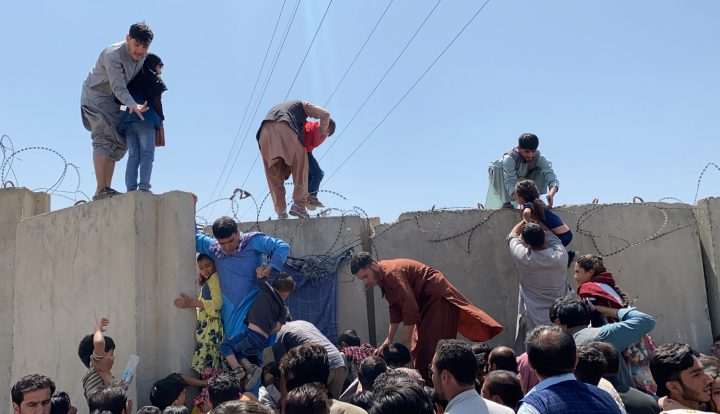
The departure from Afghanistan by the Americans is already giving rise to an increasingly acrimonious debate about whether it was all worth it, and why the US stayed there for 20 years, attempting to build a central Asian democracy upon such presumably poor soil. But there are still deeper roots to this debate that precede the war in Afghanistan.
Even as the evacuation from Kabul’s airport continues, and well before the last Afghan interpreter, American military contractor, official American and western NGO aid worker have finally been airlifted out on those massive C-17 transport planes or on commercial airliners contracted by the US government, a different battle is breaking out in Washington.
It has multiple protagonists, becoming a vicious struggle, even if it is not being fought with hi-tech weapons, but merely harsh words. Nevertheless, it calls into serious question the reputations and legacies of no fewer than four American presidents and a regiment’s worth of current and former senior officials, miscellaneous pundits, historians, journalists, commentators and, increasingly, almost anybody who can find their way around a keyboard and has a connection to a media outlet to get their views on air or in print.
At stake, of course, is apportioning the blame of who (and by which percentage and standard) should be judged responsible for the dreadful mess that became America’s dolorous foray into — and, eventually, out of — Afghanistan, after it had drawn down its forces to a few thousand personnel, albeit with near state-of-the-art military technologies and intelligence capabilities. Even if American decision-makers had been unaware of or had never read a word of Victorian-era poetry and fiction, this 20-year excursion seems cursed by Rudyard Kipling’s admonition, aimed at his beloved imperial Britain: “Here lies a fool who tried to hustle the East.”
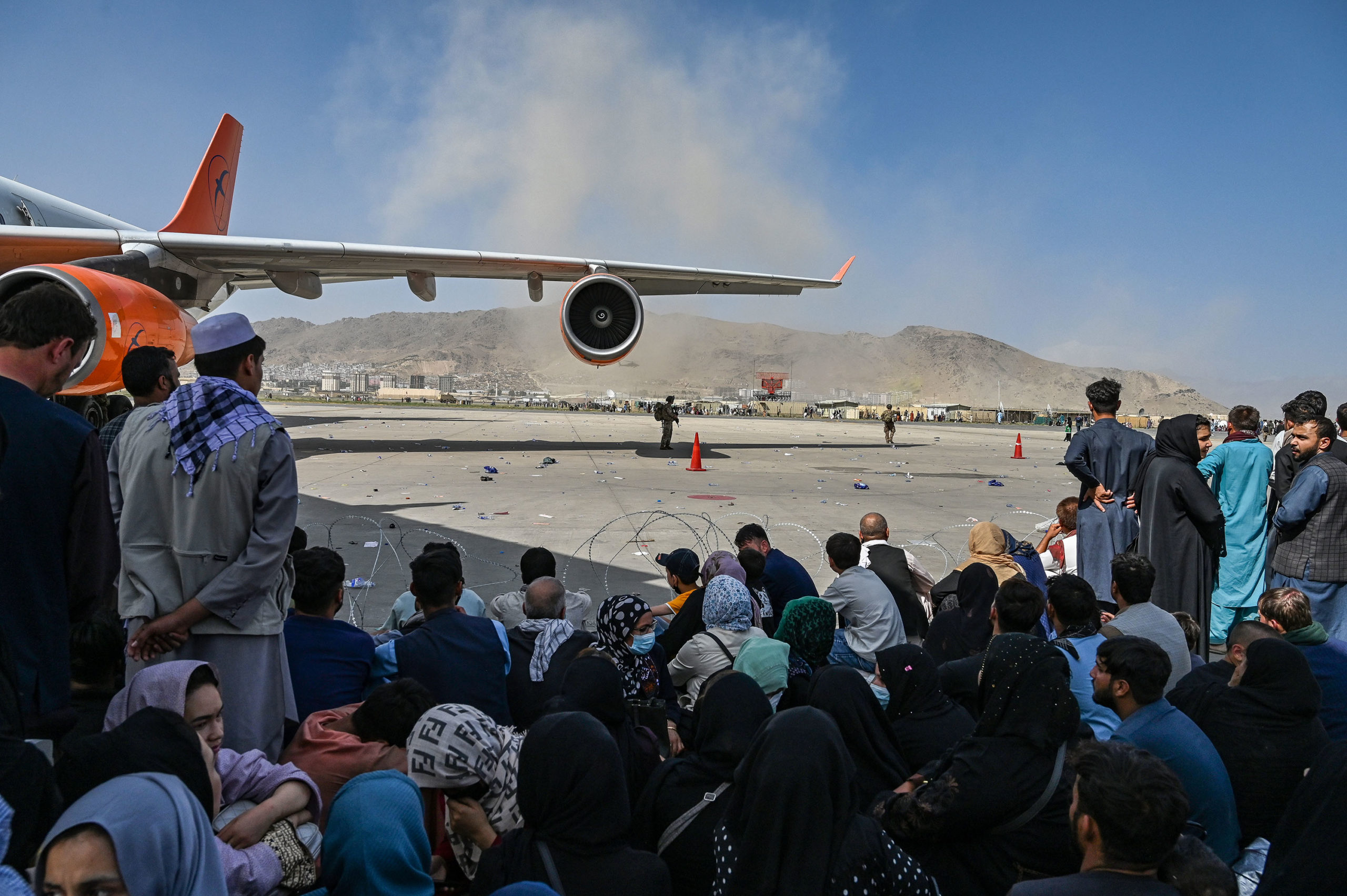
Afghan citizens wait to leave Kabul airport on August 16, 2021. (Photo: Wakil Kohsar / AFP)
The critique is now incoming from every direction. The bureaucratic infighting and finger-pointing now include the state and defence departments, the CIA and other American intelligence offices, current and former members of the White House staff, representatives and senators (and former ones) from Congress as well as foreign policy think tank and academic analysts, all eager to enter the battle over whose fault it has been.
President John Kennedy reportedly said, in the wake of the fiasco of the Bay of Pigs invasion of Cuba back in 1961, “Success has a thousand fathers while defeat is an orphan.” This time around, however, it is playing out slightly differently. There are, seemingly, a thousand would-have-been-fathers, all eager to describe how their rivals did such a terrible job raising Junior. Moreover, unlike previous foreign policy mishaps, given the 24/7 news cycle, the internet, and all-news television channels, now there are crowds of experts around, and all are eager to offer their opinions in the growing clamour, pretty much constantly, on demand, and then recycled ad nauseam.
Despite the obvious circumstances of what, specifically, has occurred — that the Afghan government collapsed in a heap once American and coalition backstopping was withdrawn virtually overnight, thereby accentuating the already perilous circumstances of Afghan government control over distant provinces and eventually the capital itself — there is no agreement about whether a modest contingent of American forces should have stayed on in Afghanistan. More basically, whether they should have been there in the first place, after al Qaeda forces had been hammered, also remains at issue. Even basic agreement on the fundamental reasons for that initial intervention hardly exists.
But these debates about the collapse of the Afghan government and its replacement by the Taliban v2.0, as fierce as these arguments are now becoming, cannot be viewed in isolation, or only in the context of the past 20 years of combat in Afghanistan. Rather, they must be seen in light of historical and ideological perspectives.
Moreover, this multi-sided scrum is only getting started. There may never be consensus. The decisions made, and the careers of those who made them, will be examined through a microscope, with harsh light shining on them, for years to come. It will likely only become more intense a fight, rather than less of one, once the flow of political “tell-all” books dealing with Afghanistan becomes a torrent, especially as the release of more and more internal staff documents under the Freedom of Information Act occurs, increasingly informing authors, analysis and arguments. But the deeper historical context cannot be ignored.
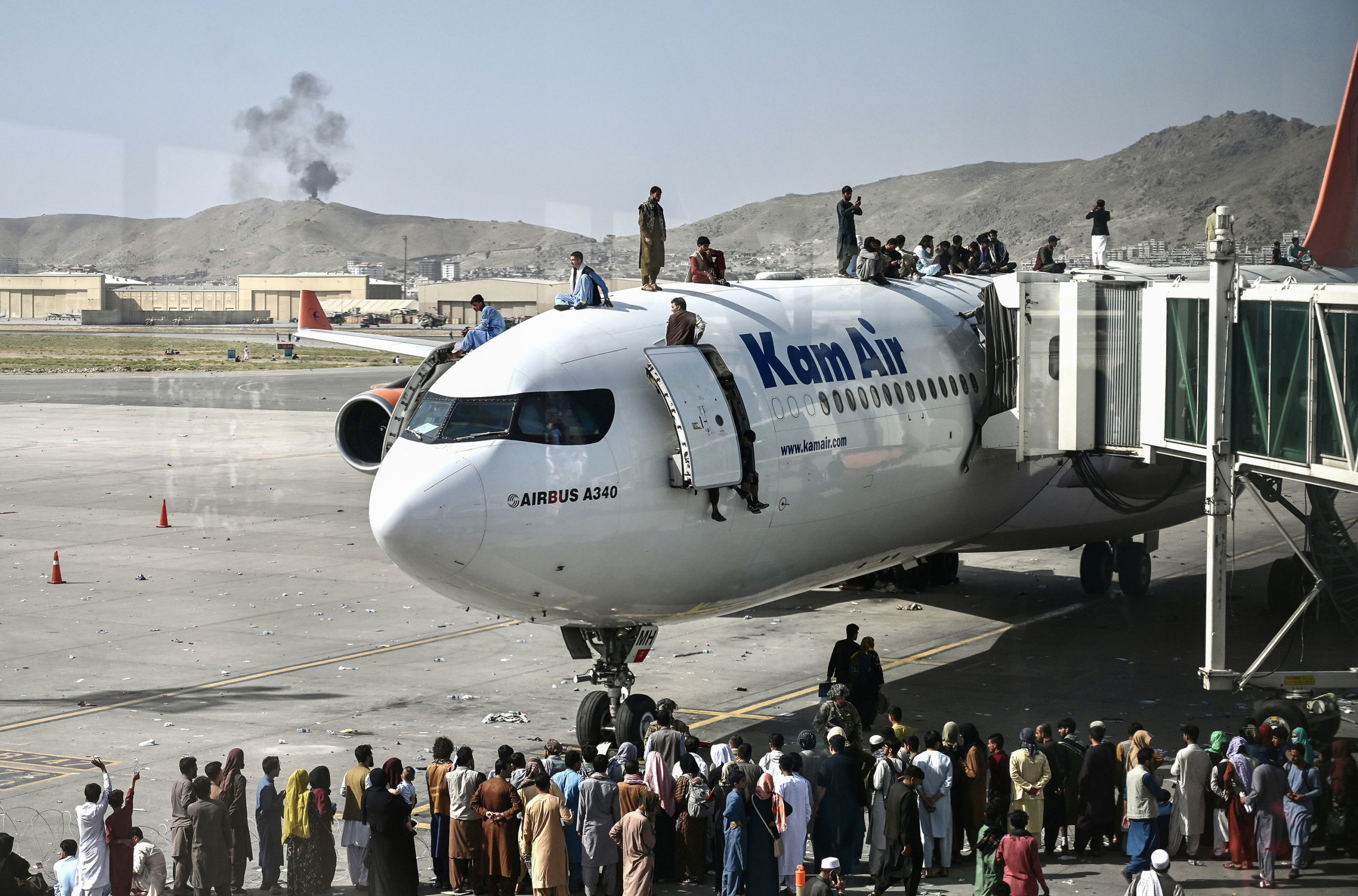
People climb atop an aircraft as they wait at the airport in Kabul on August 16 2021, after a stunningly swift end to Afghanistan’s 20-year war. Thousands of people mobbed the city’s airport, trying to flee the Taliban’s feared hardline brand of Islamist rule. (Photo: Wakil Kohsar / AFP)
In the late 1940s, after the Japanese surrender in 1945, the Kuomintang government in China under Generalissimo Chiang Kai-Shek struggled to defeat the Chinese People’s Liberation Army, the PLA, under Mao Zedong and Chao Enlai. The former was largely supplied by the US, while the latter was backed by the Soviet Union, including with stores of munitions surrendered by the Japanese to the Soviet army in Manchuria, the southern half of Sakhalin, and the Kuril Islands.
But the Kuomintang, after years of fighting the Japanese, contesting control with quasi-independent warlords in various parts of the nation, occasional fighting with the PLA, and allowing — or worse — widespread corruption and outright theft of American support, was unable to withstand the PLA. By 1949, the last vestiges of nationalist rule had been swept off the mainland and on to a redoubt on Taiwan.
Given the image of a stalwart Chiang Kai-Shek, and even more the influence of his American-educated wife, and the romantic idea of Chiang’s government in its fight against the Japanese during World War 2, Republicans in Congress, with conservative media such as Henry Luce’s Time magazine, were soon beating the drum that the Chinese defeat was something that had clearly been within the power of the US to prevent. Thus their argument became that it had potentially even been a design by the Democratic president Harry Truman and his administration to allow the communists to prevail.
The defeat of the Kuomintang, then paired with the first Soviet atomic test and revelations of a spy ring that had actually provided American nuclear secrets to the Russians, all became elements of a larger image of a nation being subverted by the Soviet Union, its allies, and its spies and fellow travellers burrowed deeply into the American defence and state departments. This became yet further energised by the outbreak of the Korean War when North Korean forces quickly advanced south.
Together, these developments coalesced into the charge, “Who lost China?”, a stance poisoning any possibility of a relationship between the US and China for more than a generation — until the final years of the Nixon era. The hysteria drove from government veteran foreign service officers and analysts who had closely followed Chinese developments and actually understood them.
Of course, even before these developments, and in competition with the country’s traditional isolationism from the disputes of the old world, the US, at least since the era of President Woodrow Wilson, has been bewitched by the idea of idealism as a core element in its foreign policy. “Wilsonian idealism” is, in fact, now a synonym for the kind of idealism given voice through his “Fourteen Points” declaration as America’s World War 1 aims. These affirmations gained a second wind in World War 2 with President Franklin Roosevelt’s “Four Freedoms” and the establishment of the UN in partial furtherance of such goals. Along the way, via the experiences of the successful rebuilding and recovery of Western Europe and Japan, the idea of “nation-building” came to be affixed to that Wilsonian idealism.
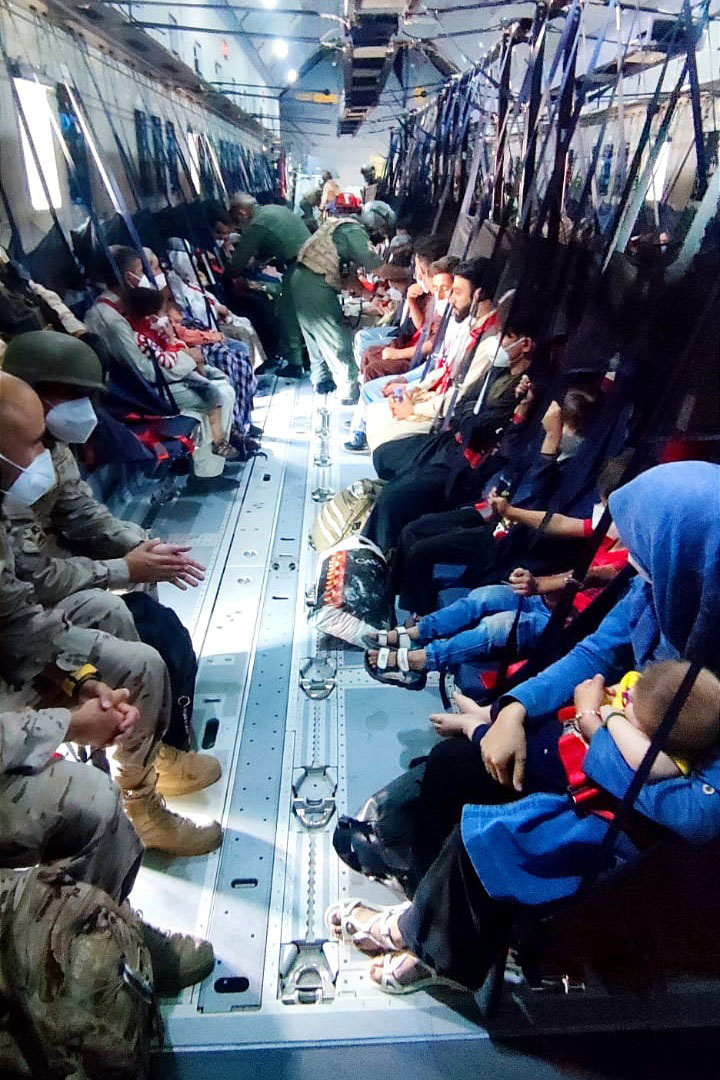
Afghans inside a Spanish aircraft in Dubai, United Arab Emirates, 20 August 2021. A second Spanish aircraft evacuated 110 Afghans from Kabul and landed in Dubai before heading to Spain where about 50 people from the group were to be hosted. (Photo: EPA-EFE / Spanish Ministry of Defence)
In the late 1950s and early 1960s, confronting the possibility that South Vietnam might fall to Ho Chi Minh’s North Vietnamese military and the local Viet Cong forces, following the French withdrawal from Indochina, America’s growing involvement in Vietnam came to represent an amalgam of realpolitik and idealist impulses. It was realpolitik through an embrace of the need to oppose the predictions of the domino theory as they applied to Southeast Asia, leading to that gradual ratcheting upward of American military commitments from a few hundred military advisers to more than half a million military personnel, along with the use of a vast array of aerial bombardments of North Vietnam.
But idealism could be seen in the growing aid programmes and ongoing political interference to somehow find Vietnamese leaders with the political strength needed to achieve a nation-building impulse strong enough that it could generate economic growth and stability for South Vietnam. Graham Greene’s novel, The Quiet American, could describe the sinister way these impulses would inevitably lead to disaster, even if the official doctrine was that just a little more effort and a few thousand more troops would finally turn the corner. Perhaps it should have been required reading in Washington, post-2001.
Nevertheless, by the early 1970s it was increasingly clear (especially to anyone who had read even a summary of The Pentagon Papers) that this was a doomed effort and that Washington policymakers knew it. By 1975 the worst actually did happen — the collapse of the Saigon regime, those many thousands of panic-stricken Vietnamese who had connections to US forces imploring American help in escaping the coming apocalypse, thousands more braving the ocean in small boats as refugees, and then helicopters taking the last American embassy staffers from a rooftop.
The resulting battles over what should or could have been done helped generate an allergy to overt American military interventionism that effectively lasted for a generation. In the years immediately after the end of American participation in Vietnam’s travails, the primacy of human rights — an important aspect of that other gravitational pull of idealism — became a more visible element of American foreign policy.
There was the creation of a new human rights division in the State Department as a demonstration of that change, and the explicit focus of the presidency of Jimmy Carter on human rights issues increasingly took hold in its public statements. The balance between realpolitik and idealism seemed to have swung substantially towards the latter. But of course there was still the little matter of the ongoing Cold War and a potentially lethal competition with the then-Soviet Union that had elements of both realpolitik and idealism.

Afghanistan evacuees board a flight to Australia on 22 August from the Australian Defence Force’s main operating base in the Middle East region. Royal Australian Air Force aircraft and personnel were deployed at short notice to the Middle East region to support urgent government efforts to evacuate Australian citizens and visa holders from Afghanistan. (Photo: LACW Jacqueline Forrester / Australian Department of Defence via Getty Images | Editor’s note: This image has been digitally altered at source to conceal identities)
Now, enter Afghanistan. With the engagement of more than a hundred thousand Russian troops in that country in support of its increasingly leftist-oriented government, Americans looked for a way to even the odds or even supplant their geostrategic foe. Supplying the Northern Alliance mujahideen forces with Stinger missiles dramatically reversed the odds, leading to the withdrawal of the Russians and the collapse of the Afghan government they had backed. (And contributing to the collapse of the Soviet Union as well.)
Nevertheless, from the other part of Afghanistan in the southern and eastern mountainous reaches, the Taliban fighters emerged and gained control over the country in succession, implementing a harsh, fundamentalist, extremist regime that also provided sanctuary for al Qaeda irregulars and, to some minds, represented the sharp point of a growing radical, fundamentalist, Muslim threat — in tandem with Iran or Iraq and their respective designs.
The 9/11 al Qaeda attacks in New York City and on the Pentagon made it inevitable that the new Bush administration would seek to destroy al Qaeda — something they virtually accomplished in short order. But through a perverse logic, that act of realpolitik metamorphosed into a kind of idealist nation-building impulse: ridding Afghanistan of its Taliban rulers and creating, out of that, the basis for a new nation-building adventure.
American-installed local rulers were, of course, never quite able to carry out this task, even with copious American aid and a cast of thousands of advisers, aides and foreign service officers. Nearly two decades later, the enormity of this failure became visible once the coalition forces’ military contingent continued to shrink and the Afghan government lost control over a growing share of the nation. When the American and other forces finally withdrew, the house of cards collapsed.
Battles over what it all meant — and will mean for the future — have begun. Was it dangerously misplaced idealism, an exercise in heartless realpolitik or a sinister expansion of the American imperium? While few Americans now argue that two decades of fighting the Taliban was necessary and appropriate, Americans largely continue to agree that dealing with al Qaeda was important, although a growing number now seems to argue the follow-on engagement with the Taliban was a waste of military strength and national treasure.
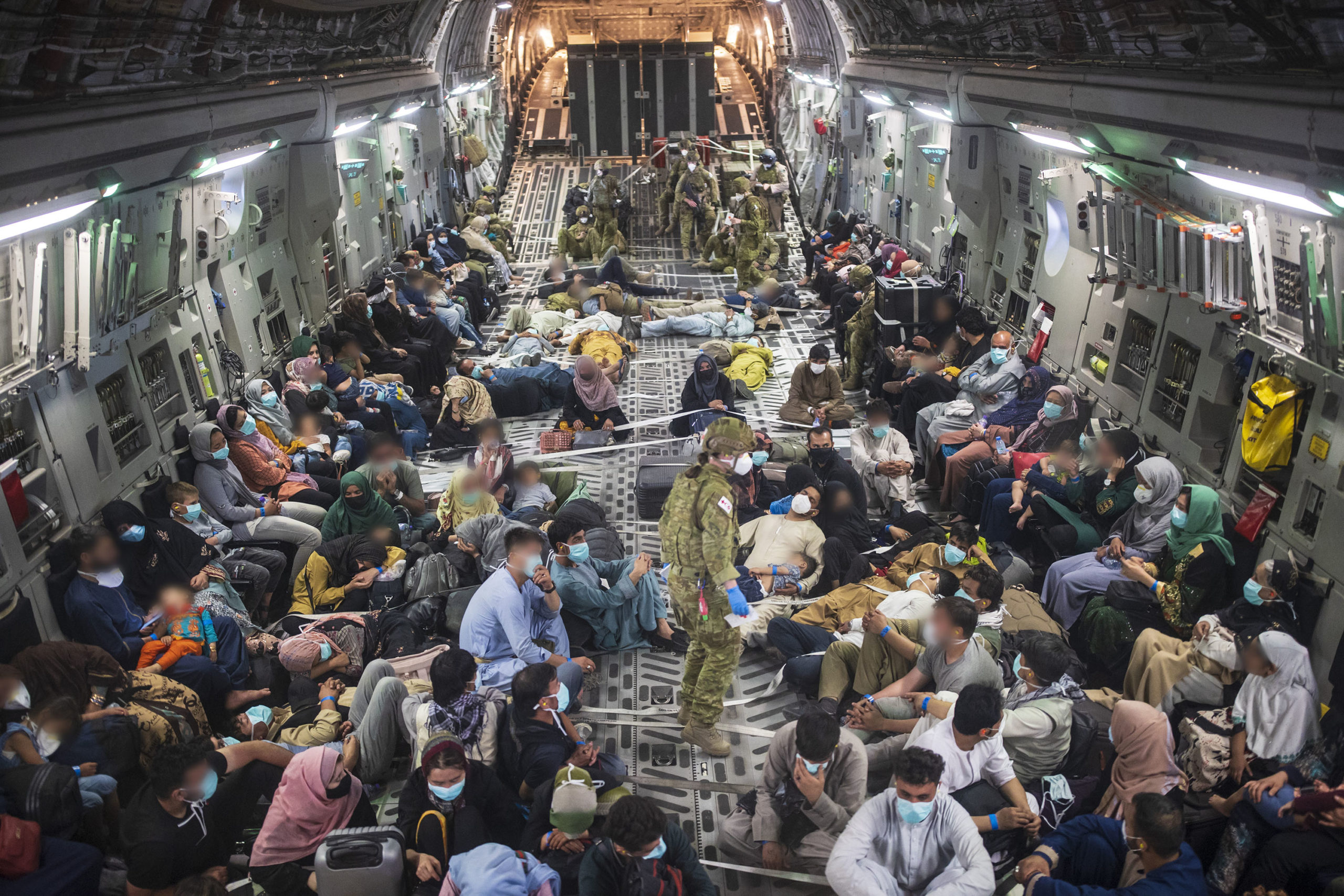
Australian citizens and visa holders travel to the Australian Defence Force’s main operating base in the Middle East region, on board a Royal Australian Air Force C-17A Globemaster III aircraft after leaving Afghanistan. Royal Australian Air Force aircraft and personnel were deployed at short notice to the Middle East region to support urgent government efforts to evacuate Australian citizens and visa holders from Afghanistan. (Photo Sgt Glen McCarthy / Australian Department of Defence via Getty Images | Editor’s note: This image has been digitally altered at source to conceal identities)
Some documents obtained by the media under FOIA disclosures paint a picture of official misunderstandings, or worse, not entirely dissimilar to the realisations from the Pentagon Papers study of the Vietnam War. As The Washington Post noted nearly two years ago, in quoting a former senior official about the war, “ ‘We were devoid of a fundamental understanding of Afghanistan — we didn’t know what we were doing’, Douglas Lute, a three-star Army general who served as the White House’s Afghan war czar during the Bush and Obama administrations, told government interviewers in 2015. He added: ‘What are we trying to do here? We didn’t have the foggiest notion of what we were undertaking.’
“ ‘If the American people knew the magnitude of this dysfunction… 2,400 lives lost,’ Lute added, blaming the deaths of US military personnel on bureaucratic breakdowns among Congress, the Pentagon and the State Department. ‘Who will say this was in vain?’ ”
But survey data also says the manner of this withdrawal was poorly planned and executed — and fault largely adheres to the sitting president — even if the stage had been set by the previous president’s ill-founded, ill-advised negotiations with the Taliban in Doha that led directly to the February 2020 agreement for an American pullout. Harry Truman’s aphorism, “The buck stops here,” continues to apply.
Just the other day, former British Prime Minister Tony Blair wrote an unusually harsh critique of the manner of the Biden administration’s winding up of America’s time in Afghanistan. He argued, “The abandonment of Afghanistan and its people is tragic, dangerous, unnecessary, not in their interests and not in ours. In the aftermath of the decision to return Afghanistan to the same group from which the carnage of 9/11 arose, and in a manner that seems almost designed to parade our humiliation, the question posed by allies and enemies alike is: has the West lost its strategic will? Meaning: is it able to learn from experience, think strategically, define our interests strategically and on that basis commit strategically? Is long term a concept we are still capable of grasping? Is the nature of our politics now inconsistent with the assertion of our traditional global leadership role? And do we care?”
He went on, saying, “We held out the prospect, backed by substantial commitment, of turning Afghanistan from a failed terror state into a functioning democracy on the mend. It may have been a misplaced ambition, but it was not an ignoble one. There is no doubt that in the years that followed, we made mistakes, some serious. But the reaction to our mistakes has been, unfortunately, further mistakes. Today we are in a mood that seems to regard the bringing of democracy as a utopian delusion and intervention, virtually of any sort, as a fool’s errand.”
Blair wound up his criticism, insisting, “We did it in the knowledge that though worse than imperfect, and though immensely fragile, there were real gains over the past 20 years. And for anyone who disputes that, read the heartbreaking laments from every section of Afghan society as to what they fear will now be lost. Gains in living standards, education particularly of girls, gains in freedom. Not nearly what we hoped or wanted. But not nothing. Something worth defending. Worth protecting.
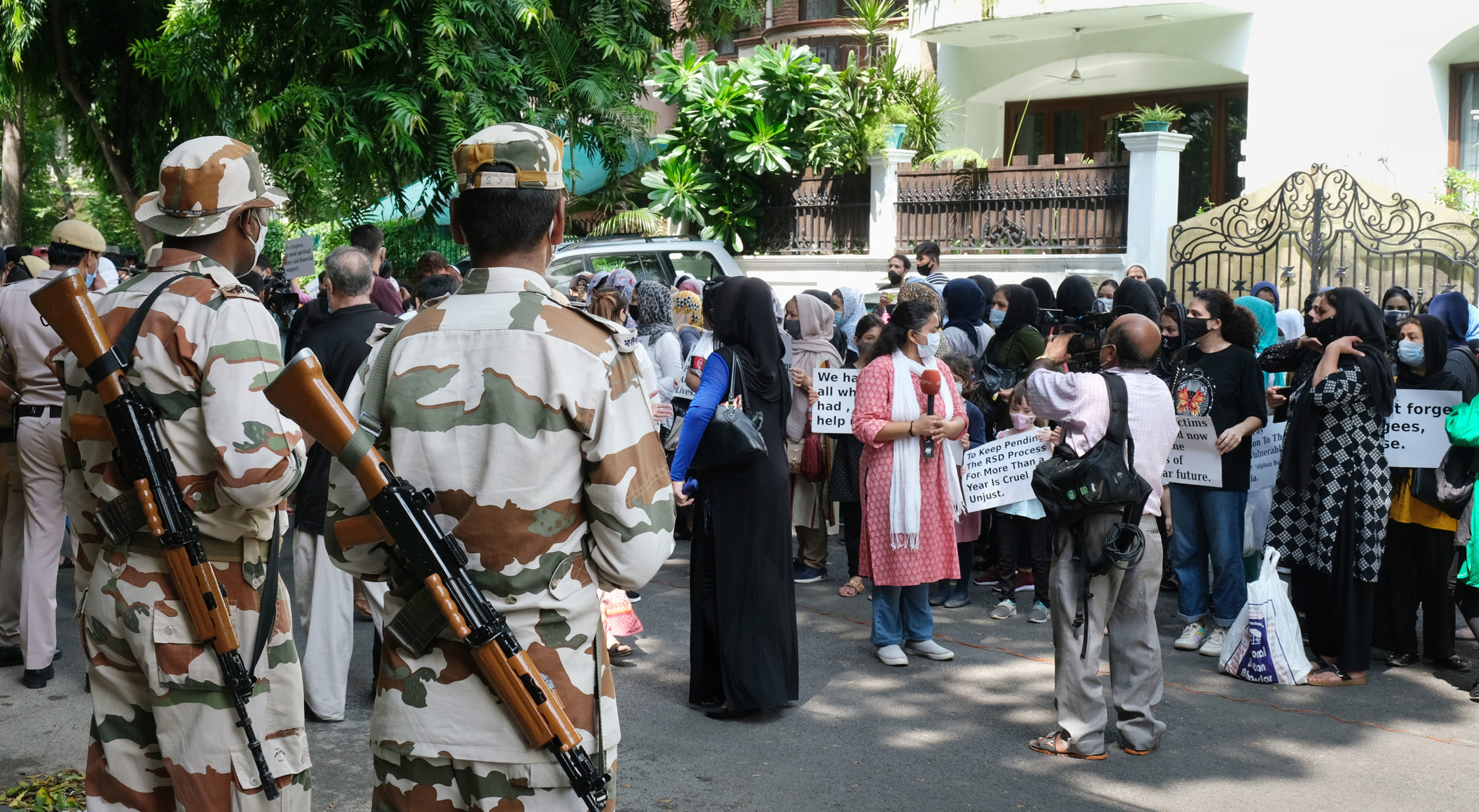
Demonstrators protest outside the office of the United Nations High Commission for Refugees in New Delhi, India, on Monday, 23 August against Taliban rule in Afghanistan and the treatment of Afghan asylum seekers in India. (Photo: T Narayan / Bloomberg via Getty Images)
“We did it when the sacrifices of our troops had made those fragile gains our duty to preserve.
“We did it when the February 2020 agreement, itself replete with concessions to the Taliban, by which the US agreed to withdraw if the Taliban negotiated a broad-based government and protected civilians, had been violated daily and derisively.
“We did it with every jihadist group around the world cheering. Russia, China and Iran will see and take advantage. Anyone given commitments by Western leaders will understandably regard them as unstable currency.
“We did it because our politics seemed to demand it. And that’s the worry of our allies and the source of rejoicing in those who wish us ill.
“They think Western politics is broken. Unsurprisingly therefore friends and foes ask: is this a moment when the West is in epoch-changing retreat?
“We need then to work out a means of dealing with the Taliban and exerting maximum pressure on them. This is not as empty as it seems. We have given up much of our leverage, but we retain some. The Taliban will face very difficult decisions and likely divide deeply over them. The country, its finances and public sector workforce are significantly dependent on aid notably from the US, Japan, the UK and others. The average age of the population is 18. A majority of Afghans have known freedom and not known the Taliban regime. They will not all conform quietly.”
By contrast, and virtually in rebuttal, columnist EJ Dionne, in The Washington Post, argued instead, “The United States is highly competent at fighting wars when the objective is clear, victory is the only option, and a large share of the public supports the engagement.
“Our country has rarely been good at sustained commitments in murky conflicts where the goal is a vague “political settlement” that is neither victory nor defeat.
“We ought to have learned that lesson long ago. Afghanistan has taught it again. It’s why President Biden finally said: Enough.
“Biden’s decision to withdraw is a cold, realpolitik judgment, as he underscored in remarks on Sunday. His prism, he said, rested on the questions: ‘Where are our national interests? Where do they lie?’ However brutal the Taliban is, however reactionary and oppressive it might be toward women in particular and dissenters from its purist religious doctrines generally, US interests would not be served by extending our military commitment any longer.” [Italics added]
In the future, these two poles of idealism and realpolitik — or a mix of them — are going to be the fulcrum around which debate is waged among Americans, and others, about this time in Afghanistan. The diplomats and generals will add critiques and some, like retired General David Petraeus and retired Ambassador Ryan Crocker, are already doing so.
We have yet to hear from the ousted Afghan government, let alone the views of the new Taliban government, or much Russian, Chinese, Indian or Pakistani commentary and opinion, but it is coming too. There will be novels and much television and video-streaming on Afghanistan and its many stories. And the Afghans themselves who escaped on those C-17s will have their own tales to tell. We should hear them out. DM




















 Become an Insider
Become an Insider
I do not understand US Politics so would normally not express an opinion. But I found the paragraph in Italics chilling! The absolute cold blooded self-centered attitude Biden expressed has left me speechless.
The Afghan army in theory could have held back the Taliban advance. 300,000 men with some of the latest arms, trained for years by thousands of foreign troops, seem to have lost the will to fight. The Afghan
people were badly served by their own security forces and government. Dealing with the Taliban never seems
to have been likely to lead to a successful outcome of an impossible situation. South Vietnam comes to mind.